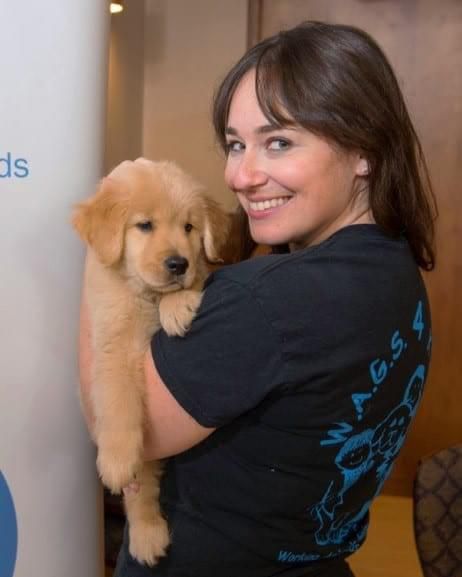CLEVELAND — A match made in prison.
“I went in as a juvenile, so, didn't even graduate high school," said Josh Allender.
Allender was incarcerated for seven years. While incarcerated, he helped train 18 service dogs through W.A.G.S 4 Kids, a nonprofit in Northeast Ohio that matches services dogs with children who need them.
“It taught me a lot to work with other people and have group working and some critical thinking,” said Allender. “That was, maybe the first time I did something very positive with myself, and I felt good to do that.”
The dogs live with the men 24/7 until it’s time to give them to the children they’re meant to help. Children like Aubrey Rupanovic, 6, who has sensory disorders.
“She is extremely delayed in speech and she receives both all services, both privately and in school, occupational therapy, physical therapy, speech therapy. So we're in therapy five days a week,” said Michelle Rupanovic, Aubrey’s mom.
A dog named Claire ended up being a perfect match to Aubrey and Rupanovic said Claire has been life-changing.
“There was a time, I didn't know if Aubrey would be able to enjoy her childhood like kids should. Every day she is met with challenges that even I can't comprehend because I haven't had to face them. I haven't had to walk in her shoes and every day poses a new challenge for both of us, both of us trying to navigate what life looks like for her, but to see her smile gave me hope that she will be able to overcome all of these, that she will be able to live a normal childhood and have memories of fun,” said Rupanovic.
Claire helps Aubrey do tasks she otherwise couldn’t do.
“She knows when Aubrey is in those moments where things are getting to be too much and she will go curl up next to her and lay her head in her lap. And that gives Audrey the chance to calm herself and settle. Whatever's working inside her, be it her anxiety, be it the transition. Sensory overload —if there's too much (like) ambulances, trucks backing up outside, she knows what she needs and she will do it. And I think she has given Aubrey confidence to be able to do things that she was not able to do,” said Rupanovic.
Allender is now the director of training for the W.A.G.S team in Northeast Ohio. He helps other incarcerated men learn to train dogs and reap the same benefits it did for him.
“People like me that have a felony conviction, you know, I can't be a school teacher or anything like that. And the fact that I can work with children is a wonderful thing. I can do something positive and I'm not judged based on my past,” said Allender.
Sera Nelson is the executive director of W.A.G.S 4 Kids and is the daughter of the founders who gave Allender a chance.

“We're able to teach these men to be service dog trainers so that they able to be entrepreneurs themselves and hopefully avoid recidivism when they get out and are able to avoid that thing that got them there in the first place,” said Nelson. “Anyone can accomplish anything when you have a feeling of self-worth and No. 1, I couldn't agree more. And No. 2, to know that our programs allow that for the men is just amazing to me."
Nelson said she not only sees a change in the children who receive a dog but the men who train them, too.
“For those that have truly dedicated themselves to the program. I have seen it give them a purpose in many ways. Guys choose it for various reasons. Some of them choose it because they have nephews with autism or nieces with autism, and they find it gives them purpose,” said Nelson. “Some you will see will tell me, they say that they just want to be seen as something other than their inmate number. And by being able to do something useful with their time that they're able to be seen for something other than their past.”
“A lot of guys really do want to become better people and that's really the goal in life always to better yourself. And a lot of guys do take that very seriously and this is the best way, unfortunately, that they can do that while they're incarcerated. So I think a lot of them will grab the bull by the horns and they take it very, very serious,” said Allender.
Rupanovic was able to take Aubrey to the correctional facility to pick-up Claire in-person as she received her dog about two years ago. She said she had to carry Aubrey inside but knew this was going to be a life-changing experience the moment Aubrey saw her dog.
“And at that point, Aubrey grabbed Claire's leash and walked out on her own. She walked out, looked back to the guys, she waved and said goodbye with a big smile on her face. And then she was ready to go and start her life with her dog," said Rupanovic.
Rupanovic couldn’t be more thankful for W.A.G.S 4 Kids and the inmates.
“What they're doing makes a difference And to see the immediate change in my daughter from the time we arrived to the time she met her dog is priceless and they did that. They took ownership, they took pride. They took the time and they made that magic happen,” said Rupanovic.



